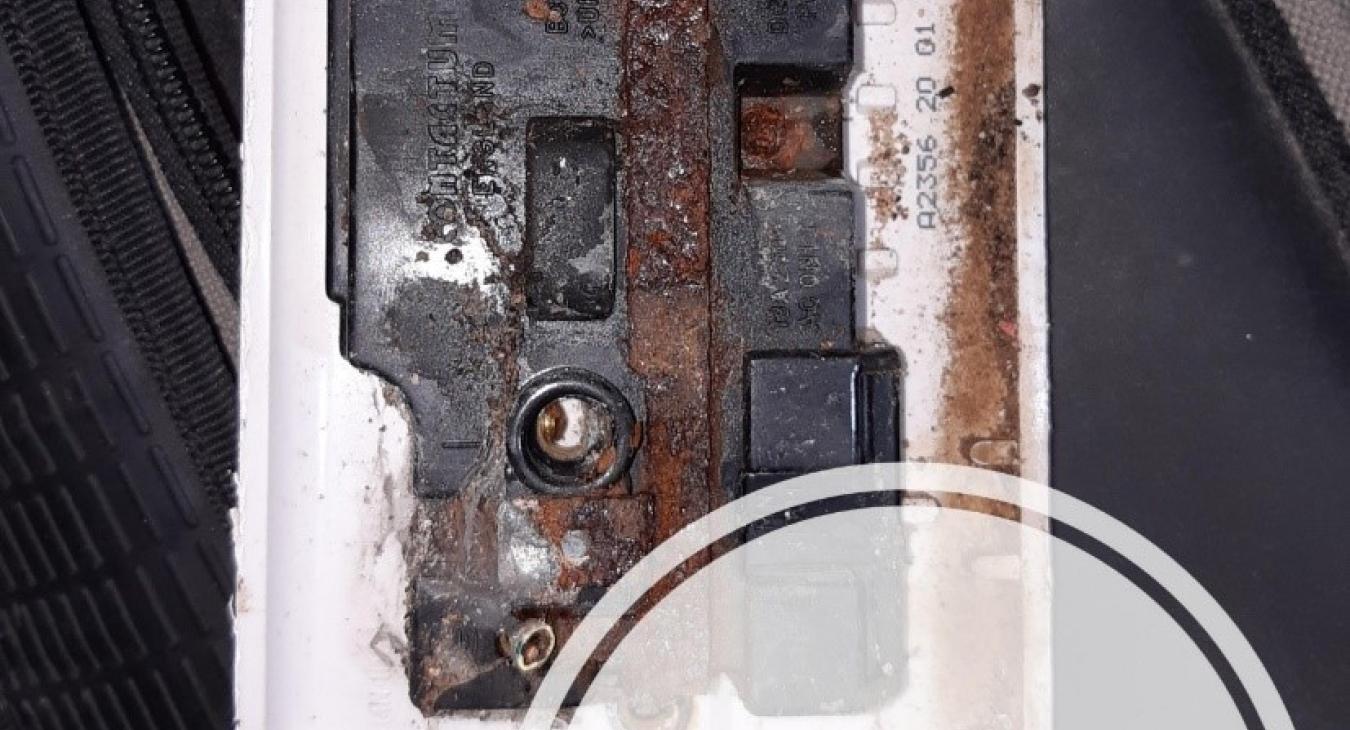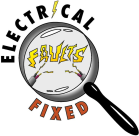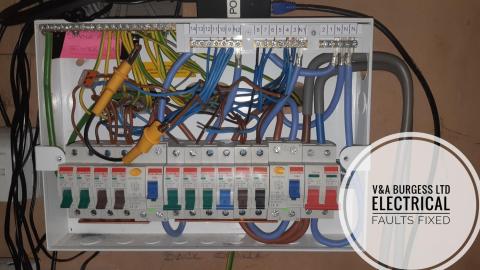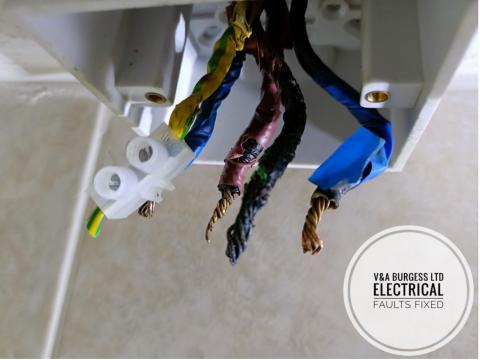
Many of us know that water and electricity do not mix. This socket is a result of WATER AND ELECTRICS due to a long slow leak from above. If you have a leak in your property, it is important that it is tackled early on and fixed before it causes problems.
What kinds of issues can water and electrics cause?
When water enters electrical systems, there can be several issues that occur. Some of these issues will be survivable by the electrical installation and others may cause more long-term damage. Typical problems following water ingress are:
- Damaged cables
- Consumer unit destruction
- Ruined Appliances
- Shorting out of electrics
- Electrical fires
- Corrosion and rust on metals
- Electric Shock and Electrocution
Damaged Cables
When water enters electrical cables, it can create a pathway for electrical currents to pass from one part of a cable to another, that is between conductors. We generally do not want Line interacting with Earth or Neutral and vice versa. We endeavour to keep all conductors in a cable electrical separated so that there are no problems in the electrical installation.
Water can lead to arcing and sparking between conductors and can leave damaged cables even after the water has dried out. It can also leave behind traces of salts and minerals that leave the insulation on the cable more conductive and less insulative than it was previously.
This effectively either ruins the cable or reduces its life span meaning that the electrical installation suffers long term consequences from the water ingress.
Consumer Unit Destruction
If water were to enter a consumer unit or fuse box then the enclosure, switches and components should be carefully examined by an electrician to see how far the water progressed inside and any damage that has been done.
Generally speaking, if these enclosures and equipment get very wet then they should absolutely be replaced. Water can cause shorting out, arcing, rust and corrosion within the components drastically reducing their lifespan, their effectiveness, and their ability to even operate in the event of a fault. I know of no manufacturer at the time of writing that is happy to allow their equipment to continue to safely operate after it has been soaked through.
Attempting to turn on such equipment following water ingress is foolhardy and potentially dangerous even after such equipment may have seemed to dry out.
Ruined Appliances
When water penetrates electrical appliances, there can be great damage done to the internal of the appliances. Whilst the appliances may seem ordinary and unaffected on the outside, internally there can be wiring and circuitry that is damaged beyond repair. This damage can include the shorting out of circuit boards and wiring which MAY NOT blow the fuse in the plug of the appliance and instead may trip the mains electrical panel / consumer unit instead.
Shorting out of electrics
What is shorting out exactly? Well, its when connections between Line and Neutral become connected directly with no resistance between then resulting in a path of very low resistance for electricity. This path of low resistance results in a massive fault current proportionate to the amount of resistance that is present.
Why is this bad? Very high fault currents will literally melt cable insulation, oxidize copper, and potentially set fire to cables or appliances. It is for this reason that we hope the electrical system has been correctly designed and installed by a professional electrician.
When a large fault current occurs in an electrical circuit, the circuit should have been designed to protect against this and the protective device should disconnect the circuit either at the consumer unit/fuse box or locally if it has been protected nearer to the fault.
Electrical Fires
Electrical fires only happen when things have gone wrong AND the electrical system has not been designed to allow for those particular set of circumstances. Most electrical systems that have been designed and installed by professionals are adequately protected against such issues occurring. When WATER AND ELECTRICS mix together, it is possible for connections and wiring to short out and fires to start, especially if there are also other issues with the wiring.
Corrosion and Rust on Metals
Water can absolutely ruin electrical systems if it is allowed to ingress. Electrical accessories in damp locations can also suffer, even if they are not directly subjected to water. Electrical terminals in accessories are fabricated from various metals which are prone to corrosion on exposure to moisture. Even low levels of moisture over elongated periods can eventually cause poor electrical connections, high resistances, and eventual failure.
Electric Shock and Electrocution
Pure water itself is a relatively poor conductor of electricity but when combined with minerals, salts, or other contaminants it can become much better at conducting electricity.
Salt Sea Water is many thousands of times more conductive than that of pure water relative to the salt concentration in the sea water. As the salt concentration increases, so does the conductivity of the water!
When water and electricity mix in our homes the electric shock risk to persons living in and using the electrical system in the home increases. This risk increases drastically when electrics in the bathroom become wet as bodies also tend to be wet in the bathroom. The electrical resistance of the human body reduces significantly when wet and this means that a more dangerous electrical current is able to flow through us when electrical faults occur.
What can be done?
Ensure that you have an in-date electrical inspection sticker on your fuse box or consumer unit meaning that the installation has been subject to an electrical check recently. For privately owned homes, this is recommended every ten years.
An electrical check will highlight any immediate or potential dangers along with any recommendations for improvements that need to be carried out.
Live in the North West?
If you have a sudden flood or unexpected leak and you need your electrics checked then call us as we are the local emergency electricians across Liverpool to Leigh. We can attend your home or premises and help to restore the power or make safe your electrics.
We can assess the damage and repair your installation if needed. If your RCD has tripped or the lights have gone off then pick up the phone. We are experts in fault finding and repairs.
We undertake lots of home insurance works and can attend with very little notice.
If you suspect that you have faulty electrics, need a rewire or have an old fuseboard that you are worried about then WhatsApp us from the website, use the contact form or just call us and have a chat.
Common Questions
How long does it take electric to dry out after a leak?
We have written an article about this for you here . This does depend upon the severity of the water ingress before drying out can occur. More importantly, has any permanent damage been done? The longer that electrical systems are subject to water the more likely it is that circuits will need rewiring, sockets replacing or the consumer unit swapping.
How long does an electrics check take?
There is an article on this subject just here.
The length of check will depend upon the size of property, number of circuits and obstacles preventing access to various electrical equipment.
Can water cause electrics to trip?
Yes. Water is a common form of trip switches operating and causing power loss to various electrical circuits around the home. The most common electrical accessories that are affected by water are those installed outside the property. Security lights, outdoor plug sockets and garden lighting are all common failure points allowing water ingress and resulting in, often multiple, electrical circuit failures.
What to do if a plug socket gets wet UK?
This does depend on the level of soaking that the socket has been subjected to! If like me, you have knocked your partners pint glass of water over the socket in the night, the electric supply has tripped and all manner of crazy has occurred then the socket should absolutely be changed.
If on the other hand you have wiped the front of the socket with a cloth that is too wet then it may be ok. The safest thing for any electrical accessory that has become wet is to have it replaced or checked by a professional with the correct test equipment and knowledge to establish if there has been any damage.
When cleaning electrical accessories, the manufacturer’s instructions should be consulted to prevent any damage or risk of electric shock.










